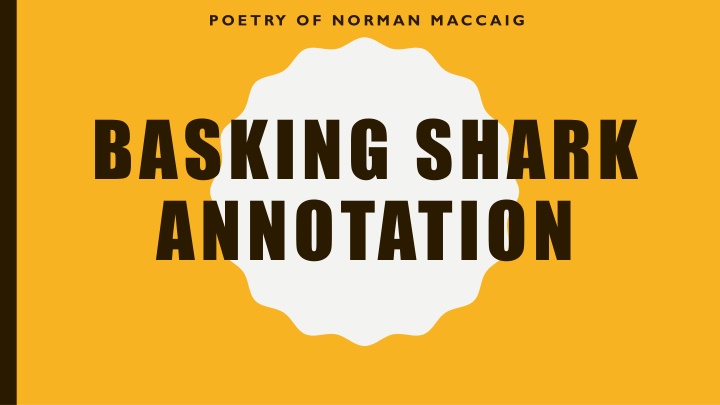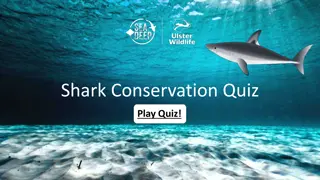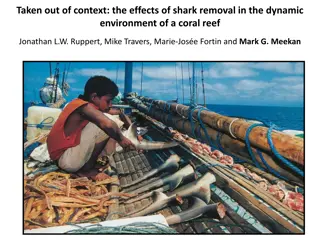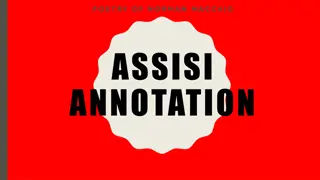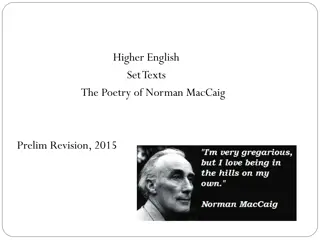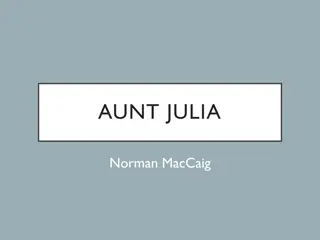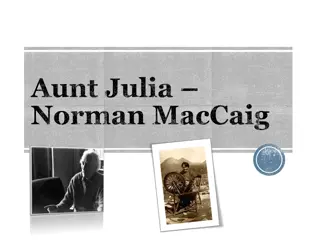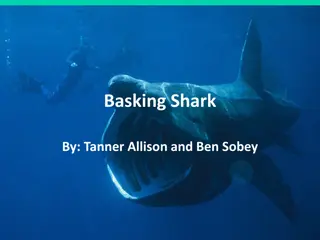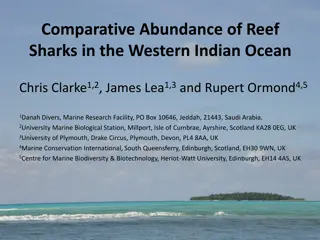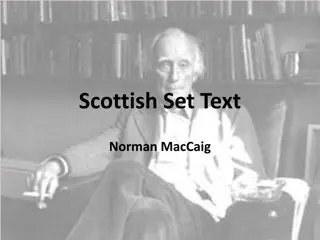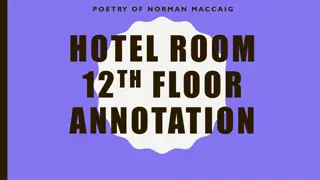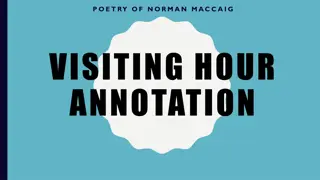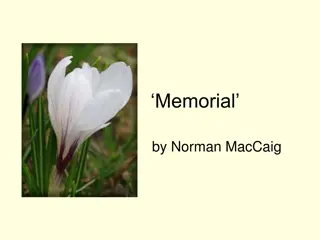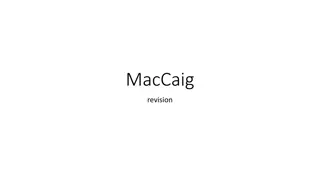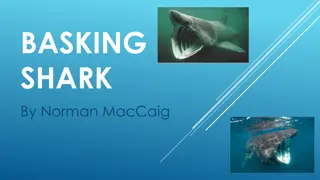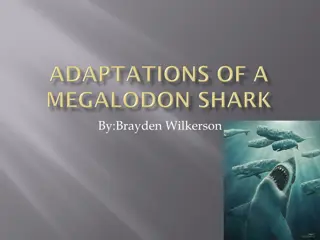Analysis of Norman MacCaig's "Basking Shark" Poem
Norman MacCaig's "Basking Shark" is a reflective poem about a unique encounter with a basking shark that leads the poet to contemplate evolution, humanity's role in the natural world, and the concept of monstrosity. Through structured stanzas and reflective themes, MacCaig explores the complex relationship between humans and the environment, raising questions about identity, evolution, and perception.
Download Presentation

Please find below an Image/Link to download the presentation.
The content on the website is provided AS IS for your information and personal use only. It may not be sold, licensed, or shared on other websites without obtaining consent from the author.If you encounter any issues during the download, it is possible that the publisher has removed the file from their server.
You are allowed to download the files provided on this website for personal or commercial use, subject to the condition that they are used lawfully. All files are the property of their respective owners.
The content on the website is provided AS IS for your information and personal use only. It may not be sold, licensed, or shared on other websites without obtaining consent from the author.
E N D
Presentation Transcript
POETRY OF NORMAN MACCAIG BASKING SHARK ANNOTATION
Poets Main Idea This poem is about a strange and unsettling encounter that MacCaig has with a Basking Shark A Basking Shark is a very large shark - reaching sizes in excess of ten metres and weighing several tonnes. They are harmless - having no true teeth - and therefore this shark wouldn t have been a real threat to MacCaig. As you can imagine encountering a shark like that in a small boat would be unnerving and scary. The subject of the poem is never mentioned in the body of the poem itself, instead we infer from the title what the poet's small boat collided with that day.
Reflective Nature of the Poem In the interview A Metaphorical Way of Seeing Things , MacCaig maintained that poetry is a psychological Optrex, it clears your eyes and you see things . Like many of MacCaig spoems, Basking Shark moves from description to reflection. This experience leads the poet to reflect on his own and humanity s relationship with the natural world and to ponder Who s the monster? .
Theme This encounter with a Basking Shark started him reflecting on evolution. He thinks about how each species took a different evolutionary path: A shark unchanged for millions of years Humans who have evolved and changed vastly over a short period of time He then thinks about who is the monster in this encounter. Is it the shark who looks as large as a monster? Or is it himself, as a representative of the human race and all the evil that humanity is capable of? The thought remains with the poet, unresolved, as the shark swims off.
Structure This poem is set out in five stanzas. Each stanza has three lines, and each line being end-rhymed with the others in the stanza. The meter of the poem is also fairly regular: the first two lines of each stanza have five stressed syllables, while the final one has four. The effect of the final shorter stressed line is to create a sense of fitting closure to the stanza. In this poem the tightness of structure serves to encapsulate the uniqueness of the experience, and the regularity of rhythm and rhyme matches the rhythmic quality of the rise and the fall of the sea itself, and likewise the steady pulling of the oars.
Stanza One To stub an oar on a rock where none should be, To have it rise with a slounge out of the sea Is a thing that happened once (too often) to me. Think about: - What happens in this stanza? - What is your impression of the shark? - What is the effect of the parenthesis? (too often)
Stanza One Metaphor comparing the shark to a rock bulky/solid without feeling or intelligence Infinitive verbs helps to capture the readers attention. To stub an oar on a rock where none should be, To have it rise with a slounge out of the sea Is a thing that happened once (too often) to me. Slounge onomatopoeia noise of waves, clumsy movement Although the poet is frightened he tries to inject humour to make light of the situation Shark that it is in charge
Stanza Two But not too often - though enough. I count as gain That once I met, on a sea tin-tacked with rain, That roomsized monster with a matchbox brain. Think about: - What point the poet is making about the encounter - How the writer creates the sense of rain - The impact of the description of the shark
Dash indicates no rush. While it is frightening at first, he now thinks experience is worthwhile Stanza Two Emphasises experience is worthwhile explains reasons why in rest of poem But not too often - though enough. I count as gain That once I met, on a sea tin-tacked with rain, That roomsized monster with a matchbox brain. Met experience is now not a shock. He can now think about what is happening Visual/aural imagery Can see and hear the rain on the sea (now that shock has passed he can concentrate on small details
Stanza Two There is clever use of long and short vowels in this final line too: the long vowels in roomsized monster appropriately extend and elongate the expression to reinforce the size of the shark in contrast to the short, clipped vowels of matchbox brain. But not too often - though enough. I count as gain That once I met, on a sea tin-tacked with rain, That roomsized monster with a matchbox brain. Basic animal - large animal with small brain like a dinosaur. Opposite to us Contrast shows difference between physical and mental capacities Roomsized emphasises size Monster low down on evolutionary scale
Stanza Three He displaced more than water. He shoggled me Centuries back - this decadent townee Shook on a wrong branch of his family tree. Think about: - What does the poet start thinking about? - What is the effect of the word shoggled - What is family tree a reference to?
Stanza Three Idea of shark making him rethink his life and man s position in it. Shark in control again shark moving him. Self deprecating Use of colloquial words. He displaced more than water. He shoggled me Centuries back - this decadent townee Shook on a wrong branch of his family tree. Enjambment Draws attention to the words. Shows he is thinking back to prehistoric times. Decadent townee Moved far away from his origins Decadent -- he has lost a sense of purpose in his life and become too immersed in the pursuit of hedonistic pleasures He is reminded that this shark too is part of our own family tree and is inextricably linked to us in much the same way as any other ancestor.
Stanza Four Swish up the dirt and, when it settles, a spring Is all the clearer. I saw me, in one fling, Emerging from the slime of everything. Think about: - What point is he making in first two lines? - What is slime a reference to?
Stanza Four An analogy is made at the opening of this stanza between stirring up dirt in a spring and the water then being all the clearer, and the present situation the speaker finds himself in. The onomatopoeic swish of the water also alludes to the idea of displacement in the previous stanza. The dirt in this case is the murky thought of how humans evolved into what they now are. The idea of dirt in our origins continues with the choice of the word slime Swish up the dirt and, when it settles, a spring Is all the clearer. I saw me, in one fling, Emerging from the slime of everything. Emphasises the sudden nature of his thoughts/how one encounter can change your point of view
Stanza Four Swish up the dirt and, when it settles, a spring Is all the clearer. I saw me, in one fling, Emerging from the slime of everything. The primeval slime from which we and all other living organisms were created, linking the evolution of humanity once more with that of the shark. How the poet (and us) is connected to every animal through evolution Emerging moving/developing from prehistoric times Also highlights the epiphany and clarity of vision he now has.
Stanza Four So who's the monster? The thought made me grow pale For twenty seconds while, sail after sail, The tall fin slid away and then the tail. Think about: - Why does the poet ask this question? What is his reaction to the question? - Has his opinion of the shark changed from stanza one?
Stanza Five Not so confident as to who the superior being is This magnificent, awesome creature is monstrous simply because of its relative size, but in the metaphorical sense it is clear the speaker now considers humanity to be the true monster. So who's the monster? The thought made me grow pale For twenty seconds while, sail after sail, The tall fin slid away and then the tail. Doesn t think about it for long emphasises how man is the monster Shark is an elegant being contrast to at the start of the poem
An Overview of the Stanzas Stanza One MacCaig describes the chance meeting with the shark and makes it clear it has happened before. Stanza Two the meetings have had an effect on him and he thinks back to one particular meeting. Stanza Three he begins to question his position in the evolutionary process. Stanza Four explains how indistinct humans were from other species at the beginning of the evolutionary process. Stanza Five his opinion of the shark changes and the poet reveals that he is not so sure of his own superiority over the rest of nature.
Revision Tasks To help you remember the key points of the poem you should: Write a summary of the poem showing how the poet moves from experience to reflection. Identify a key quote for each of the following points: The poet views the shark as an unthinking animal The poet begins to question his beliefs because of this incident The poet realises that it is not the shark who is dangerous By the end of the poem the poet sees the beauty in the animal Write down and analyse any images used
